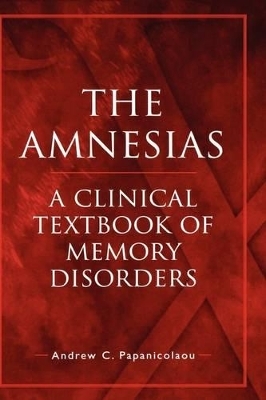
The Amnesias
A Clinical Textbook of Memory Disorders
Seiten
2006
Oxford University Press Inc (Verlag)
978-0-19-517245-4 (ISBN)
Oxford University Press Inc (Verlag)
978-0-19-517245-4 (ISBN)
Talks about the disorders of memory that result from psychological stress, traumatic injury, strokes, or degenerative diseases of the brain. This book deals with each amnesia syndrome in a separate chapter that includes an account of the symptoms and the tests used to assess them. It is useful for neurologists and neuropsychologists.
This concise but comprehensive text provides a systematic account of the memory disorders, whether they result from psychological stress, traumatic injury, stroke, or degenerative disease of the brain. The major amnesia syndromes are covered in consistently organized chapters that give a clear description of the clinical signs and symptoms, predisposing factors, prevalence and prognosis, pathophysiology to the extent that it is known, diagnostic approaches including tests used to evaluate the disorders, and therapeutic efforts. The book's emphasis is on facts rather than theory, and readers from a variety of disciplines will appreciate its clear, jargon-free, well-organized assessment of the state of knowledge about the memory disorders. These disciplines include neurobiology, neuropsychology, psychiatry, cognitive neuroscience, rehabilitation medicine, and gerontology. Even theorists will find the book useful since any theory of memory and its neuropsychological mechanisms must be constrained by the facts of amnesia if it is to be considered complete.
The book's clearcut scheme of organization will enhance its value and user-friendliness. It divides the amnesias into three types: progressive, permanent, and transient. The first type includes amnesias associated with neurodegenerative diseases such as Alzheimer's and Parkinson's, and with vascular dementias, contrasting them with memory decline resulting from normal aging. The second type consists of classis amnesic syndromes associated with limbic lesions of various etiologies such as Korsakoff's encephalopathy and traumatic brain injuries. The third type includes transient global, transient epileptic, and ECT-induced amnesias as well as the reversible psychogenic amnesias associated with dissociative and fugue states. These discussions are preceded by two introductory chapters that define the mnemonic and amnesic phenomena, classify the various memory systems and functions, and describe the putative brain circuitry underlying these functions, including molecular mechanisms, neurotransmitter systems, and the effects of stress-related hormones and drugs, with the aid of magnetic resonance images and anatomical drawings.
This concise but comprehensive text provides a systematic account of the memory disorders, whether they result from psychological stress, traumatic injury, stroke, or degenerative disease of the brain. The major amnesia syndromes are covered in consistently organized chapters that give a clear description of the clinical signs and symptoms, predisposing factors, prevalence and prognosis, pathophysiology to the extent that it is known, diagnostic approaches including tests used to evaluate the disorders, and therapeutic efforts. The book's emphasis is on facts rather than theory, and readers from a variety of disciplines will appreciate its clear, jargon-free, well-organized assessment of the state of knowledge about the memory disorders. These disciplines include neurobiology, neuropsychology, psychiatry, cognitive neuroscience, rehabilitation medicine, and gerontology. Even theorists will find the book useful since any theory of memory and its neuropsychological mechanisms must be constrained by the facts of amnesia if it is to be considered complete.
The book's clearcut scheme of organization will enhance its value and user-friendliness. It divides the amnesias into three types: progressive, permanent, and transient. The first type includes amnesias associated with neurodegenerative diseases such as Alzheimer's and Parkinson's, and with vascular dementias, contrasting them with memory decline resulting from normal aging. The second type consists of classis amnesic syndromes associated with limbic lesions of various etiologies such as Korsakoff's encephalopathy and traumatic brain injuries. The third type includes transient global, transient epileptic, and ECT-induced amnesias as well as the reversible psychogenic amnesias associated with dissociative and fugue states. These discussions are preceded by two introductory chapters that define the mnemonic and amnesic phenomena, classify the various memory systems and functions, and describe the putative brain circuitry underlying these functions, including molecular mechanisms, neurotransmitter systems, and the effects of stress-related hormones and drugs, with the aid of magnetic resonance images and anatomical drawings.
1. Phenomenon and Constructs ; 2. Putative Brain Mechanisms of the Various Memory Function ; 3. Age-related Memory Decline ; 4. Amnesia Associated with the Dementias ; 5. Semantic Amnesia ; 6. Limbic Amnesia ; 7. Traumatic Amnesia ; 8. Transient Global Amnesia ; 9. Transient Eplieptic Amnesia ; 10. Electroconvulsive Therapy-Induced Amnesia ; 11. Psychogenic Amnesias ; 12. Notes for a Theory of Memory ; Appendix: Neuropsychological Tests
| Erscheint lt. Verlag | 5.1.2006 |
|---|---|
| Zusatzinfo | 23 halftones, 8 line drawings, tables |
| Verlagsort | New York |
| Sprache | englisch |
| Maße | 242 x 164 mm |
| Gewicht | 599 g |
| Themenwelt | Geisteswissenschaften ► Psychologie ► Biopsychologie / Neurowissenschaften |
| Geisteswissenschaften ► Psychologie ► Klinische Psychologie | |
| Medizin / Pharmazie ► Medizinische Fachgebiete ► Neurologie | |
| Medizin / Pharmazie ► Medizinische Fachgebiete ► Psychiatrie / Psychotherapie | |
| Naturwissenschaften ► Biologie ► Humanbiologie | |
| Naturwissenschaften ► Biologie ► Zoologie | |
| ISBN-10 | 0-19-517245-0 / 0195172450 |
| ISBN-13 | 978-0-19-517245-4 / 9780195172454 |
| Zustand | Neuware |
| Haben Sie eine Frage zum Produkt? |
Mehr entdecken
aus dem Bereich
aus dem Bereich
Grundlagen, Klinik, Rehabilitation
Buch | Softcover (2024)
Urban & Fischer in Elsevier (Verlag)
CHF 78,40
Buch | Spiralbindung (2022)
modernes lernen (Verlag)
CHF 41,90
Grundlagen, Klinik, Therapie und Verlauf der …
Buch | Softcover (2024)
Kohlhammer (Verlag)
CHF 117,60


